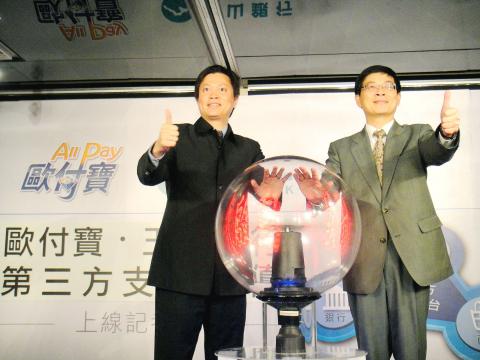E.Sun Commercial Bank (玉山銀行), the banking arm of E.Sun Financial Holding Co (玉山金控), yesterday launched an alliance with AllPay Financial Information Service Co (歐付寶) to jointly offer payment services for online shoppers, making them the first companies to tap the new business.
The joint venture came after the government last month allowed non-financial institutions to provide third-party payment services as online shopping gains popularity and looks like growing into another multibillion-dollar industry.
“E-commerce turnover totaled more than NT$700 billion last year,” E.Sun Bank president Joseph Huang (黃南州) told a media briefing.

Photo: Chang Hui-wen, Taipei Times
Online shopping may develop into a multitrillion-dollar business as more sellers and buyers close deals over the Internet, fueling demand for third-party payment services to facilitate the transactions, Huang said.
The new business may enable E.Sun Bank to increase its customer base and fee income, though the benefits may not be evident in the initial stages.
Individuals may open accounts with deposits of up to NT$10,000 at E.Sun Bank to pay for online shopping, Huang said. The regulator may raise the cap after third-party payment services prove their worth.
Fee income amounted to NT$4.29 billion at E.Sun Financial in the first half of the year, accounting for 32.7 percent of total earnings and up 19.8 percent from the same period the previous year, company data showed.
“E.Sun Bank aims to be the No. 1 local player in e-commerce,” Huang told an investors’ conference last month.
AllPay Financial, a subsidiary of MacroWell OMG Digital Entertainment Co (歐買尬), a Taiwanese supplier of online games, has business ties with 8,000 stores which serve 120,000 customers, chief executive Calvin Lin (林一泓) said.
The partnership with E.Sun is also expected to help AllPay grow its customer base in both Taiwan and China, as buyers and sellers feel more comfortable conducting business via the Internet, Lin said.
Lin said the company was happy that the financial watchdog extended third-party payment services to non-financial firms, an issue that cost former Financial Supervisory Commission chairman Chen Yuh-chang (陳裕璋) his job after he refused to give the go-ahead.
Separately, Bank SinoPac (永豐銀行), the main source of income of SinoPac Financial Holding Co (永豐金控), launched its own online payment service.
The firm would not sit on the sidelines when total e-commerce turnover is forecast to increase by 17 percent this year and hit NT$1 trillion in 2015, Bank SinoPac president Tina Chiang (江威娜) said.
The new service would be an opportunity for Bank SinoPac to increase its customer base, both individuals and small companies, Chiang said, adding that the lender plans to join forces with Pixnet Digital Media Corp to explore niche markets.

To many, Tatu City on the outskirts of Nairobi looks like a success. The first city entirely built by a private company to be operational in east Africa, with about 25,000 people living and working there, it accounts for about two-thirds of all foreign investment in Kenya. Its low-tax status has attracted more than 100 businesses including Heineken, coffee brand Dormans, and the biggest call-center and cold-chain transport firms in the region. However, to some local politicians, Tatu City has looked more like a target for extortion. A parade of governors have demanded land worth millions of dollars in exchange

Hong Kong authorities ramped up sales of the local dollar as the greenback’s slide threatened the foreign-exchange peg. The Hong Kong Monetary Authority (HKMA) sold a record HK$60.5 billion (US$7.8 billion) of the city’s currency, according to an alert sent on its Bloomberg page yesterday in Asia, after it tested the upper end of its trading band. That added to the HK$56.1 billion of sales versus the greenback since Friday. The rapid intervention signals efforts from the city’s authorities to limit the local currency’s moves within its HK$7.75 to HK$7.85 per US dollar trading band. Heavy sales of the local dollar by

Taiwan Semiconductor Manufacturing Co’s (TSMC, 台積電) revenue jumped 48 percent last month, underscoring how electronics firms scrambled to acquire essential components before global tariffs took effect. The main chipmaker for Apple Inc and Nvidia Corp reported monthly sales of NT$349.6 billion (US$11.6 billion). That compares with the average analysts’ estimate for a 38 percent rise in second-quarter revenue. US President Donald Trump’s trade war is prompting economists to retool GDP forecasts worldwide, casting doubt over the outlook for everything from iPhone demand to computing and datacenter construction. However, TSMC — a barometer for global tech spending given its central role in the

An Indonesian animated movie is smashing regional box office records and could be set for wider success as it prepares to open beyond the Southeast Asian archipelago’s silver screens. Jumbo — a film based on the adventures of main character, Don, a large orphaned Indonesian boy facing bullying at school — last month became the highest-grossing Southeast Asian animated film, raking in more than US$8 million. Released at the end of March to coincide with the Eid holidays after the Islamic fasting month of Ramadan, the movie has hit 8 million ticket sales, the third-highest in Indonesian cinema history, Film